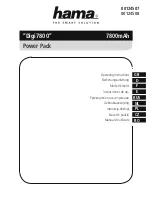
- 803 -
B3- Vorgesehene Arbeits-
techniken
Die Bohreinheit ist für folgende
Arbeitstechniken konstruiert .
Alle von diesen Verwendungen ab-
weichenden Arbeitstechniken sind
an dieser Bohreinheit nicht vorgese-
hen und deshalb nicht erlaubt :
- Bohren von Löchern in alle Holzar-
ten mit oder ohne Tiefenanschlag
- Einbohren von Schlitzen in Vollhöl-
zer z.B.:
Einstemmen von Türschlössern
bündiges Einbohren von Beschlä-
gen
- Herstellen von Dübelbohrungen
- Ausbohren von Astlöchern
- Herstellung von Zapfen für Ast -
löcher.
B4- Verbotene Arbeitstechniken
Folgende Arbeitsgänge sind auf die-
ser Bohreinheit zusätzlich nicht
erlaubt.
- Fräsarbeiten aller Art mit reinen
Fräswerkzeugen
- Schleifen von Metallteilen wie z.B.
Hobelmesser
B5- Restrisiken
Die hauptsächlichen Gefahren die
an einer Bohrmaschine auftreten
können sind :
- unbeabsichtigten Kontakt der
Hände mit dem rotierenden Werk-
zeug
- Kippen des Werkstückes durch
unzureichende Werkstückauflage-
fläche.
- Wenn der Bohrkopf auf das Hobel-
wellenende montiert ist -> Kon-
takt-
gefahr mit der dre-
henden Hobel-
welle
Trotz Verwendung der entsprechen-
den Schutzvorrichtungen und Ein-
haltung der spezifischen Unfallver-
hütungsvorschriften bleiben bei Ver-
wendung der Bohreinheit folgende
Restrisiken bestehen :
- Gehörschädigung durch Lärmbe-
lastung
- Unfallgefahr im nicht abgedeckten
Schneidenbereich des rotierenden
Werkzeuges.
- Verletzungsgefahr beim Werk-
zeugwechsel (Schnittgefahr )
- Quetschen der Finger
- Gesundheitsrisiko durch die beim
Arbeiten auftretende Staubbelas-
tung (Eichen- und Buchenstaub)
B3- Techniques d´utilsisation
prévues
La mortaiseuse est conçue pour les
techniques de travaux suivantes:
Toutes autres techniques même
dérivées ne sont pas prévues de par
conception et sont cond interdites.
- Percages de trous dans toutes les
essences de bois avec ou sans
butée de profondeur
- Usinage de mortaises dans du bois
massif comme p.ex.:
Longement de serrures de portes,
encastrement de ferrures.
- Percements pour tourillons
- Elimination de noeuds
- Réalisation de tampons pour dito.
B4- Techniques d´utilisation inter
dites
Les travaux suivants sont interdits
sur cette mortaiseuse:
- Fraisage ou toupillage avec des
outils contendants
- Poncage ou affûtage de pièces
metalliques comme p.ex:
Fers de rabot-dégau
B5- Risques latents
Les principaux risques à l´utilisation
de la mortaiseuse sont:
- Contact involontaire des mains
avec l´outil en rotation
- Basculement de la pièce à usiner
par manque de surface d´appui
- Lorsque le mandrin est monté en
bout d´arbre de rabot-dégau, ris-
que de contact avec l´arbre en
rotation
Malgré l´utilisation de protecteur et
le respect des régles de sécurité, il
subsiste des risques latents:
- Surdité du fait d´exposition prolon-
gée au bruit
- Risques d´accidents dans la zone
de rotation non protégée de l´outil.
- Risques de blessures au change-
ment et montage d´outillage
(coupures).
- Ecrasement des doigts.
- Alteration de santé du fait d´inhala-
tion prolongée d´atmosphère anor-
malement chargés de particules,
en particulier de chêne, hêtre et
certains essences exotiques.
B3- Proper working techniques
The drilling assembly is designed for
the following tasks.
Any other tasks that are not listed
here are not suitable for the drilling
assembly and are therefore prohibi-
ted:
-drilling holes in all wood types with
or without depth stop
-drilling slots in solid wood e.g.:
sinking door locks, flush sinking of
hardware
-drilling dowel holes
-boring out knot holes
-making plugs for knot holes.
B4- Prohibited working
techniques
The following tasks are also prohibi-
ted on this drilling assembly:
-routing work of all types with rou-
ting tools
-grinding of metal parts e.g., planer
blades.
B5- Remaining risks
The main sources of danger on a
drilling machine are:
- unintentional contact of the hands
with the rotating tool
- tipping of the workpiece due to
insufficient supporting surface
- when the drilling head is mounted
on the end of the planer arbor ->
danger of contact with the rotating
planer arbor.
Despite using the appropriate pro-
tective devices and observing the
specific accident prevention regula-
tions, the following risks remain
when you use the drilling assembly:
- hearing damage from high noise
levels
- danger of accidents from the
unprotected cutter area of the
rotating tool
- danger of injury when changing
tools (danger of cuts)
- squeezing the fingers
- health risk due to dust emission
during work (oak and beech dust).
Summary of Contents for BF 6-26
Page 2: ......
Page 59: ...205 Ger teliste Schaltplan Nr 1 Parts list wiring diagram no 1 Liste des composantes sch ma 1...
Page 61: ...207 Ger teliste Schaltplan Nr 2 Parts list wiring diagram no 2 Liste des composantes sch ma 2...
Page 63: ...209 Ger teliste Schaltplan Nr 3 Parts list wiring diagram no 3 Liste des composantes sch ma 3...
Page 65: ...211 Ger teliste Schaltplan Nr 4 Parts list wiring diagram no 4 Liste des composantes sch ma 4...
Page 67: ...213 Ger teliste Schaltplan Nr 5 Parts list wiring diagram no 5 Liste des composantes sch ma 5...
Page 69: ...215 Ger teliste Schaltplan Nr 6 Parts list wiring diagram no 6 Liste des composantes sch ma 6...
Page 71: ...217 Ger teliste Schaltplan Nr 7 Parts list wiring diagram no 7 Liste des composantes sch ma 7...
Page 73: ...219 Ger teliste Schaltplan Nr 8 Parts list wiring diagram no 8 Liste des composantes sch ma 8...
Page 80: ...226 1x220V 3 2 Motore mit Bremse 1x220V 3 2 motors with brake 1x220V 3 2 Moteurs avec frein...
Page 82: ...228 1x220V 1 Motor ohne Bremse 1x220V 1 motor without brake 1x220V 1 Moteur sans frein...
Page 84: ...230 1x220V 1 Motor mit Bremse 1x220V 1 motor with brake 1x220V 1 Moteur avec frein...
Page 87: ...233 Ger teliste Schaltplan Nr 27 Parts list wiring diagram no 27 Liste des composantes no 27...
Page 89: ...235 Ger teliste Schaltplan Nr 28 Parts list wiring diagram no 28 Liste des composantes no 28...
Page 213: ...813...












































